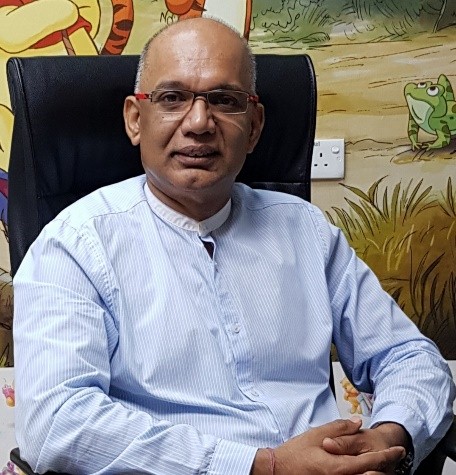
Delving into the world of autism

Dr Shan sharing his experience of meeting autistic children
In conjunction with World Autism Awareness Day, a webinar titled “Autism Spectrum Disorder ‘The Rising Star’” was jointly organised by the Centre for Learning and Teaching (CLT) and the Centre of Applied Psychology (CAP), in collaboration with Persatuan Pembangunan Pendidikan Kanak-kanak Istimewa (3PKI) on 2 April 2021 via ZOOM.
Led by Organising Chairperson Geetha Veerappan, the webinar aimed to educate the public and parents, and raise awareness on autism disorder. Invited speaker and Consultant Paediatrician, ICF certified professional coach, HRDF certified trainer, and professional speaker Dr Shan Narayanan enlightened participants on the basics, management and latest information about autism disorder. He also highlighted on parents empowerment and communication, in addition to accentuating the collaboration among professionals working with families with autism disorder.
He kick-started the webinar by sharing one of his experiences encountered 17 years ago, with an autistic child having arrived at this clinic, screaming. He described that the reason for the autistic child’s behaviour was due to his fear of a new environment and that he was having difficulty adapting to his new surroundings. With the song “Twinkle Twinkle Little Star” sang by his mom, the autistic child was able to calm down and Dr Shan mentioned that music is indeed helpful to calm autistic children. Dr Shan also mentioned that the autistic child was unable to communicate as he was seen shouting again while looking at a water bottle; it turned out that the autistic child wanted a drink. Through his observation and many questions asked to the mother, Dr Shan later diagnosed the child with Autism Disorder Spectrum level three.
Over the years, with therapies and parental involvement for the autistic child, Dr Shan said the child made many improvements and at the age five, he was able to speak. Today, the autistic child is studying in a private college and is enrolled in an accounting course, although he still has some difficulties understanding social situations and making friends. He highlighted that supportive parents can bring out the ability of an autistic child.
The interactive session that followed provided participants more information on autism disorder. “Normal development has four domains, which are gross motor; vision and fine motor; hearing, speech and language; and social, emotional and behavioural. Among normal children, their development improves with age, and we call that their developmental milestone. However, when a child has not achieved a certain skill at the median age, this red flag will be reviewed and if the child still has not achieved that skill at the limit age, then it can be considered a delayed development,” explained Dr Shan.
“So what exactly is autism? It is a neurobiological disorder and it is a life-long developmental disability. An autistic child has impaired communication, impaired social interaction, and has restricted rigid repetitive behaviours. Autism spectrum disorder can be classified into High-functioning autism, autism, or severe autism, and about five per cent are savants, meaning having special skills in certain areas like music or art. In fact, autism is four to five times more common in boys,” said Dr Shan.
He went on to list some of the traits of an autistic child, which included speech delay/speaks in own language, active, not playing with other children, not engaging with children in kindergarten, different behaviours, and severe temper tantrum. He also described the process transpired before diagnosing the child with autism disorder, and it includes pre-interview, interview, observation and investigation.
“There are three functional levels of autism. At level one, the child requires support, and the autistic child has difficulty initiating social interaction. Organisation and plating problems can hamper independence. At level two, the autistic child requires substantial support, and social interaction is limited to narrow special interests. The autistic child will also have frequent restricted or repetitive behaviours. At level three, the autistic child requires very substantial support, and has severe deficits in verbal and nonverbal social communication skills. The autistic child also displays great distress and difficulty in changing actions or focus,” the speaker explained.
“It becomes important to understand the child, and identify their strengths and weaknesses. It is important to identify the kind of support they need. Therefore, management depends on the age and severity of the autistic child. For a child, early intervention is helpful, some ways of managing include parent empowerment, teaching in a specialised environment, and therapy. For school-age children, the autistic children can either enrol in mainstream schools, mainstream schools with support, special education integration school, or special education school. They will also require educational psychologist support. For young person and adult with autism, it is important that they gain self-esteem and self-confidence and identify their abilities. There are vocational trainings for them as well,” said Dr Shan.
He later explained the roles and functions of Pusat Jagaan 3PKI in helping children with autistic. “Parent empowerment is important, and with the right support given to an autistic child, the outcomes can be positive,” enthused Dr Shan.
Dr Shan explaining the meaning of autism
© 2021 UNIVERSITI TUNKU ABDUL RAHMAN DU012(A).
Wholly owned by UTAR Education Foundation (200201010564(578227-M)) LEGAL STATEMENT TERM OF USAGE PRIVACY NOTICE